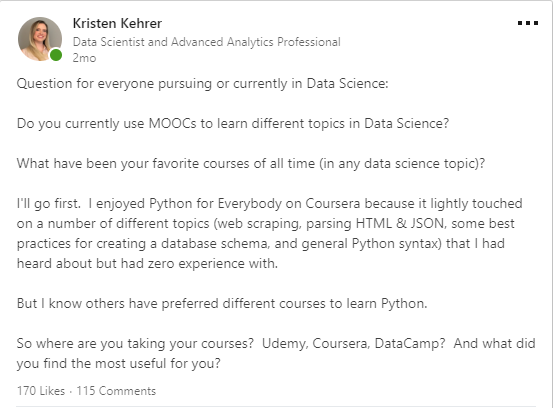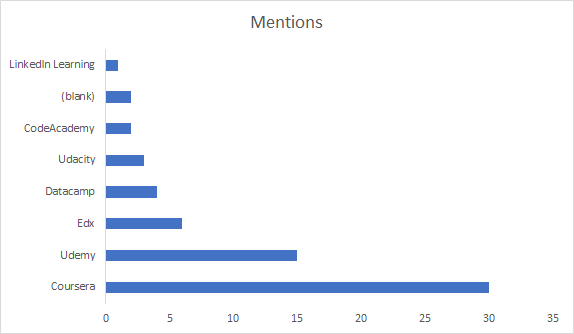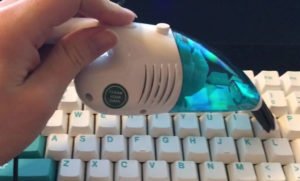via GIPHY
Ok, so I’m sure some are interested in seeing just how “cutting edge” the course gets.
Once you're combining deep learning Gluon models and machine learning models using ensembling methods, you might be the coolest kid at work (but I’m not making any promises). Gluon is a package that was created by Amazon in Python. So you’ll leverage both Python and R for Gluon.
Some of the deep learning algorithms you’ll learn how to leverage are:
DeepAR
DeepVAR
N-Beats
Deep Factor Estimator
Module 18 of the course is where you'll get into deep learning. A couple years ago I might have said "deep learning, bah humbug, requires too much computing power and isn't necessary, simpler is better." As things change and progress (and computers get even more beefy) I'm definitely changing my tune. Especially as an ensemble N-Beats algorithm beat the ES-RNN's score in the M4 competition. M competitions are prestigious forecasting challenges, and they've historically been won by statistical algorithms. (I wouldn't have known this information without this course). The stuff being taught in this course is very current and the sexy new techniques that are winning the big competitions.
Here's a look at the syllabus for preparing the data and learning about the DeepAR model. You're doing log transformations, Fourier Series, and when you get to modeling the course even covers how to handle errors. I just love it. I know I'll be referring back to the course when a time series use case pops up in the future.
The course covers 17 different algorithms. I'm trying to think if I could name 17 algorithms off the top of my head… it’d take me a minute. ARIMA is obviously included, because It’s like the linear regression of time series. You’ll go through ARIMA, TBATS (a fave because you don’t need to worry about stationarity the way you do with ARIMA. I’ve used this one in industry as well).
Along with these other algos:
Then you’ve got your ensemble algos being leveraged for time series:
GLMNET
Random Forest
Neural Net
Cubist
SVM
Strap in for 8 solid hours of modeling, hyperparameter tuning, visualizing output, cross-validation and stacking!
Everything else:
Matt (the owner of Business Science) speaks clearly and is easy to understand. Occasionally I'll put him on 1.25x speed.
His courses in general spend a good amount of time setting the stage for the course. Once you start coding, you’ll have a great understanding of where you’re going, goals, and context (and your file management will be top notch), but if you’re itching to put your fingers on the keyboard immediately, you’ll need to calm the ants in your pants. It is a thorough start.
You have to already feel comfy in R AND the tidyverse. Otherwise you’ll need to get up to speed first and Business Science has a group of courses to help you do that. You can see what's included here.
Before we finish off this article, one super unique part of the course I enjoyed was where Matt compared the top 4 time series Kaggle competitions and dissected what went into each of the winning models. I found the whole breakdown fascinating, and thought it added wonderful beginning context for the course.
In the 2014 Walmart Challenge, taking into account the “special event” of a shift in holiday sales was what landed 1st place. So you're actually seeing practical use cases for many of the topics taught in the course and this certainly helps with retention of the material.
Likewise, special events got me good in 2011. I was modeling and forecasting gas and the actual consumption of gas and number of customers was going through the roof! Eventually we realized it was that the price of oil had gotten so high that people were converting to gas, but that one tripped me up for a couple months. Thinking about current events is so important in time series analysis and we'll see it time and again. I've said it before, but Business Science courses are just so practical.
Summary:
If you do take this course, you’ll be prepared to implement time series analysis to time series that you encounter in the real world. I've always found time series analysis useful at different points in my career, even when the job description did not explicitly call for knowledge of time series.
As you saw from the prerequisites, you need to already know R for this course. Luckily, Business Science has created a bundle at a discounted price so that you can both learn R, a whole lot of machine learning, and then dive into time series. Plus you’ll get an additional 15% off the already discounted price with this link. If you're already comfortable in R and you're just looking to take the time series course, you can get 15% off of the single course here.
Edit: People have asked for a coupon to buy all 5 courses at once. That's something I'm able to do! Learn R, machine learning, beginner and advanced Shiny app development and time series here.







